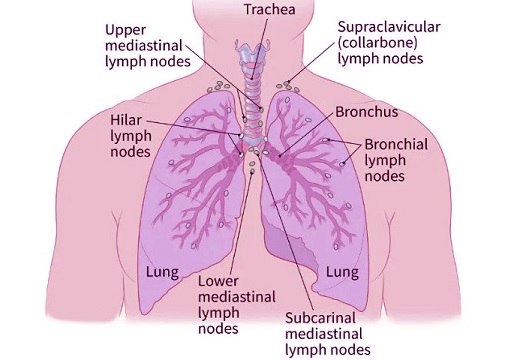Unique Immune Patterns Revealed in Lung-Associated Lymph Nodes of COVID-19 Patients
Nikhil Prasad Fact checked by:Thailand Medical News Team Nov 09, 2024 5 months, 1 week, 2 days, 10 hours, 42 minutes ago
Medical News: The recent study conducted by researchers from Lausanne University Hospital-Switzerland, Lausanne University-Switzerland, and the Feinberg School of Medicine at Northwestern University-USA reveals how COVID-19 impacts the immune system’s organization within lymph nodes. These findings, centered on the role of the Bcl6 protein within lung-draining lymph nodes, give us a glimpse into the disease’s lasting immune effects. This
Medical News report explores the study’s insights into how immune cells interact within lymph nodes, particularly around Bcl6, a key player in immune cell development.
 Unique Immune Patterns Revealed in Lung-Associated Lymph Nodes of COVID-19 Patients
The Role of Bcl6 in Lymph Nodes
Unique Immune Patterns Revealed in Lung-Associated Lymph Nodes of COVID-19 Patients
The Role of Bcl6 in Lymph Nodes
Bcl6 is a protein known for its role in helping certain immune cells mature and organize within germinal centers. These centers, found within lymph nodes, are where immune cells like B cells (responsible for creating antibodies) develop. In the lymph nodes of COVID-19 patients, researchers identified three categories based on Bcl6 expression levels: low/no Bcl6, intermediate, and high. Each category showed unique immune activity, with Bcl6-high tissues displaying more mature immune cell interactions. This study highlights how these differences might explain immune reactivity in COVID-19 and potential immune memory formation.
Key Findings on Immune Cells and Bcl6 Levels
The research team found that lymph nodes from COVID-19 patients exhibited a distinctive clustering of B and T follicular helper (TFH) cells, especially in Bcl6-high regions. TFH cells play a critical role in helping B cells become antibody-producing cells. The study demonstrated that:
-Bcl6-High Tissues Showed High Immune Activity: In Bcl6-high regions, there were more B and TFH cells, particularly those in active states (shown by markers like Ki67, which is associated with cell proliferation). This high activity suggests that these areas might be crucial in developing COVID-19-specific antibodies.
-Distinctive Spatial Organization of Cells: In areas with high Bcl6 expression, immune cells were closely arranged, facilitating cell interactions needed to generate strong immune responses. This clustering was less apparent in Bcl6-low or intermediate regions, which might be indicative of less mature immune responses.
-Age-Related Immune Differences: Age appeared to play a role in immune organization, with older donors showing more pronounced Bcl6 expression. This finding underscores how age-related immune decline could influence immune responses to COVID-19.
Increased Inflammation Markers and Immune Response Variation
Interestingly, the study found that Bcl6-high lymph nodes had elevated levels of C-reactive protein (CRP), an inflammation marker commonly associated with severe COVID-19 cases. Despite this increase, these nodes did not show higher numbers of immune cells like
neutrophils, which are typically linked to inflammation. Researchers suggest this immune profile reflects a more specialized immune environment within lung-associated lymph nodes in response to the virus.
Genes That Influence Immune Function in COVID-19
Further analysis revealed that the Bcl6-high lymph nodes had increased gene expression related to germinal center function, including genes involved in B and TFH cell development. Conversely, the Bcl6-low areas showed more TH1-type immune genes, often linked to inflammation. Some genes associated with the Bcl6-low profile included those for signaling proteins like STAT4 and CXCR3, which help drive inflammatory immune responses. Meanwhile, Bcl6-high regions had elevated expression of genes like CXCL13, associated with germinal center support and immune memory formation.
Potential for Improved Immunity in COVID-19 Survivors
By establishing these immune characteristics, researchers believe the Bcl6-high nodes might play a role in generating long-term immunity. The concentrated immune activity within these nodes suggests that they could be crucial for developing immune memory, which could provide some protection against future SARS-CoV-2 exposures or new variants.
Conclusion
This study sheds light on the complex immune response in COVID-19, particularly within lung-associated lymph nodes where Bcl6 expression seems to influence immune organization and activity. The clustering of B and TFH cells in Bcl6-high nodes suggests an environment conducive to robust immune responses. These findings underscore the importance of understanding immune patterns within specific organs affected by COVID-19, especially as scientists work toward better vaccines and treatments.
The study findings were published on a preprint server and are currently being peer reviewed.
https://www.biorxiv.org/content/10.1101/2024.11.07.622471v1
For the latest COVID-19 News, keep on logging to Thailand
Medical News.
Read Also:
https://www.thailandmedical.news/news/stanford-study-published-in-leading-journal-shows-that-mrna-jab-generated-spike-proteins-circulate-in-blood-and-persist-for-months-in-lymph-nodes
https://www.thailandmedical.news/news/breaking-covid-19-news-study-alarmingly-finds-that-recovered-individuals-who-only-had-mild-covid-19-exhibit-glymphatic-system-dysfunction
